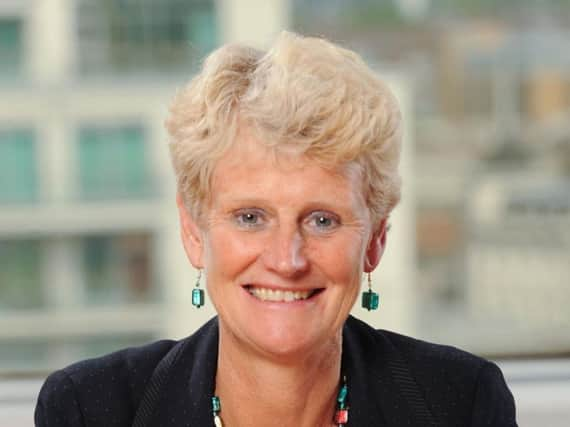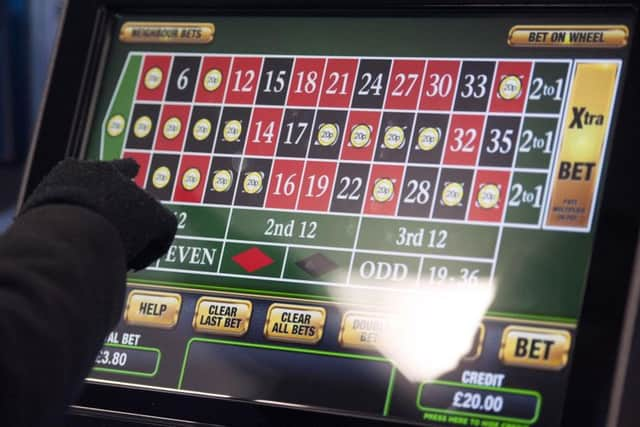'Sponsorship in sport should be allowed' - The Big Interview with Brigid Simmonds, chair of the Betting and Gaming Council


Headlines involving the gambling industry appear to be impossible to avoid, from Bet365 chief Denise Coates’ bumper pay packet to Hamilton Accies coach Brian Rice’s very public betting ordeal. In a bid to address “problem gambling”, the government last year introduced a crackdown on fixed-odds betting terminals (FOBTs), which saw the maximum stake cut from £100 to £2, while this April will see the roll-out of a credit card ban that means gambling customers will only able to use debit cards or cash deposited in a bank account.
It was announced just last week that the industry’s safe betting slogan, “When the fun stops, stop”, will soon be dropped after controversy over its message, which some have claimed appears to advertise gambling rather than discourage it.
Advertisement
Hide AdAdvertisement
Hide AdAmid all of this, Brigid Simmonds, chair of the recently formed Betting and Gaming Council (BGC), has emerged with very clear ambitions for the future of the industry, which employs more than 100,000 people in the UK and contributes in excess of £14 billion to the British economy. Simmonds, who served as chair of the British Beer & Pub Association (BBPA) for more than a decade, said: “The clear objective of the association is raising the standards of safer gambling. We know we’ve come in for a lot of criticism and we probably haven’t been best in class in the past, but we’re determined that we will be in future. At our launch we unveiled 22 commitments to the industry which covered a whole range of things from looking at advertising technology, how and who we advertise to, and game design.”


Simmonds is the first to hold the position, as the BGC sprang into action in November after the merging of three industry trade bodies: the Remote Gambling Association, the Association of British Bookmakers and the National Casino Forum. It represents around 90 per cent of the gambling industry in the UK including bookmakers, casinos and online gambling operators and the so-called Big Five betting groups.
Online risks and regulations
An estimated 24 million adults gamble in the UK, with 10.5 million of those placing bets online. In certain respects this has made it easier to identify vulnerable players, but it also increases risk in other ways.
“Obviously with online betting it’s a very high-tech industry so the knowledge of what people are doing in that industry is quite strong within the companies,” says Simmonds. “We want people to gamble safely and we have to recognise that online is a global industry. I don’t believe in prohibition anyway, but even if you did close down the industry in this country, it would be available to gamblers elsewhere. I was talking to someone who was a problem gambler the other day who was saying he is still being inundated by thousands of overseas unregulated games trying to encourage him to gamble. So we need to be, as an industry, best in class, we need to set the highest possible standards, we need to be world leading.”
This means striking a balance between safe and fun, regulated and leisurely. It’s a challenge that has echoes of her previous role heading up the BBPA, as she says: “People don’t go to the pub to be told what to do, and you don’t go and watch football to be told what to do either. But there are subliminal ways of getting messages across and encouraging people to be safer in their gambling habits.”
Simmonds, who sits down with Scotland on Sunday the week before appearing before a House of Lords select committee focused on potential changes to the UK’s current gambling legislation, is pushing for closer collaboration between banks, big tech and the gambling sector. She says: “The service is intervening more and working to promote affordability. There are a couple of things we need to look at. One is sharing data, which will be difficult. If one of our members stops a customer gambling, they can’t tell our other members that they are doing it. So we’re already talking to government about how we do that.”
The loot box dilemma
Bank of Scotland, Halifax, Lloyds, Santander and Barclays now allow customers to block payments to certain types of retailer, including gambling services, while many online betting services include features such as a profit and loss account to keep a running total of funds and the ability to set a deposit limit. A particular strand of the BGC’s awareness efforts (each member company gives 0.1 per cent of gross gaming yield to research and education) is dedicated to protecting children.
NHS mental health director Claire Murdoch has recently called for a ban on virtual loot boxes (in-game purchases where players don’t know what’s in a box until they’ve bought it), which are not currently covered by gambling regulations, and questions are being raised in parliament about whether they should be reclassified to be considered a form of gambling.
Advertisement
Hide AdAdvertisement
Hide AdRegardless of the outcome, Simmonds is attempting to make safe enjoyment of risk and gambling part of the dialogue between parents and their children. “When your son or daughter goes off to university, you talk about how much you should drink – you’ve got to do that with gambling as well. Our children will have a much better grip on technology than we do and we need to make sure that we’re having those discussions and that we’re setting some rules around how they use their phones and their games.
“We’ve supported education in schools, and from September this year there will be a requirement for PSHE [Personal and Social Education in Scotland] to have an element which teaches children not about gambling, but to understand risk.” The industry has given £10 million to charities GamCare, which is intervening directly with young people in Scotland, and WhyGam, which is training staff to teach the risk module.
Simmonds is also a former trustee of the charity GambleAware, as well as an ex-director of Leicester City, a football club she has supported her whole life. She hails the whistle-to-whistle ban introduced this season to prevent gambling advertisements being screened from five minutes before until five minutes after live sport, for reducing gambling advertising on television by 85 per cent. Bookies are now considering a “voluntary” ban on pitchside and football shirt advertising to expand on this.
Sponsorship in sport
This is a poignant topic for Scottish sports fans, with Hamilton head coach Brian Rice currently facing Scottish FA charges related to gambling. Betting firms currently sponsor the three main men’s football competitions in Scotland, but this is set to change with the news that Ladbrokes Coral will no longer put its name to the Scottish football league next season.
“Obviously in Scotland there’s been a real concern about sport sponsorship,” says Simmonds. “I actually think that sponsorship in sport can be done, should be allowed, and the same issues occur as in alcohol sponsorship but what we’ve got to make sure is that the companies themselves are looking at responsible messaging and looking at how they can encourage people.
“I’m also aware that we want people to be more active, we want clubs to be putting money into grassroots sports. Lots of clubs do an awful lot in their local communities. We need to be making sure that they can afford to do that and obviously sponsorship is one way. We will be setting up a sponsorship code just as already exists for alcohol and we want to make sure that the message is responsible.”
The idea of high street betting shops as a sense of community is also something Simmonds would like to promote. This includes BGC’s own work across Scotland with the White Ribbon campaign, which tackles gender-based violence. Simmonds says the strong connection between the community and staff helps to facilitate open and honest conversations about difficult topics. Since the campaign launch, 4,250 customers – predominantly men – have signed the pledge never to commit, condone or remain silent about violence towards women.
Traditional betting shops have had to adapt like fellow high street retailers to a reduction in footfall as out-of-town outlets become increasingly popular. Some of this innovation is being driven by Scotland, with William Hill launching its first cafe concept betting shop in Glasgow’s Argyle Street.
Advertisement
Hide AdAdvertisement
Hide AdThe shift contributed to Scotland’s largest independent bookmaker Scotbet being sold in a pre-pack administration deal last summer, with the bookie citing the reduction of FOTB stakes as “the straw that broke the camel’s back” along with a shift toward online betting and increasing competition.
Simmonds, visiting Edinburgh as a judge for the Great British High Street awards, concludes: “Just as pubs, in my former incarnation, are important to high streets so are betting shops. Betting shops and their managers really care about their customers, and they want to make sure that they have the right experience but they also stay safe.”
